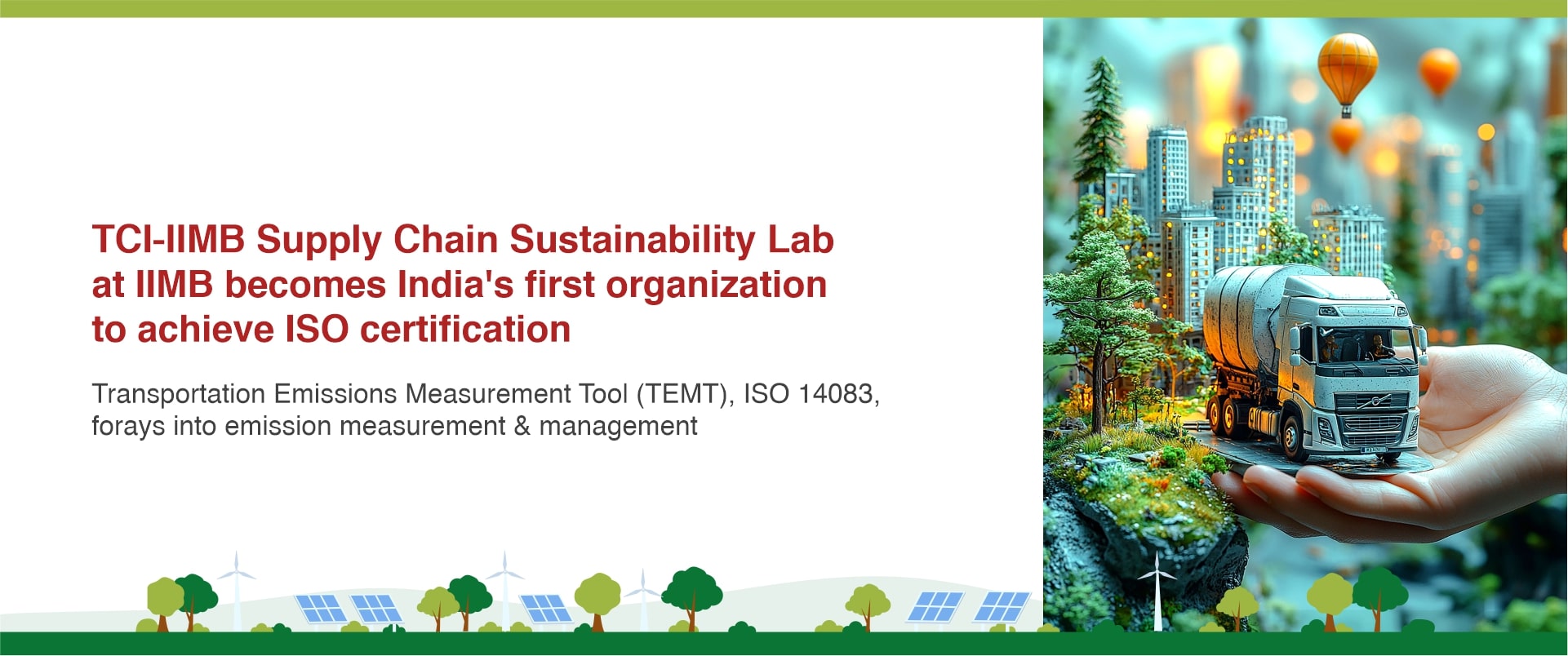Introduction
In response to the escalating call for decarbonization of value chains and the imperative to manage scope three emissions, IIM Bangalore has established the TCI-IIMB Supply Chain Sustainability (TCI-IIMB SCSL) Lab. This dedicated lab is designed to assist organizations in their journey towards achieving net-zero goals. The TCI-IIMB SCSL Lab represents a significant initiative aimed at propelling sustainability in logistics and supply chain management to the forefront.
The Center aims to serve as a hub for collaboration between academia, industry, and policymakers, fostering innovation and driving positive change in supply chains worldwide. By leveraging the expertise of our faculty and partners, we seek to address the complex challenges facing modern supply chains while promoting environmental stewardship, social responsibility, and economic prosperity.
Through research projects, industry collaborations, and educational programs, the Center will develop and disseminate cutting-edge practices and tools to help organizations enhance the sustainability of their supply chains. Our goal is to empower businesses to adopt sustainable practices that not only reduce their environmental footprint but also create value for stakeholders and society at large.
We invite you to join us on this journey towards building a more sustainable future through responsible and ethical supply chain management. Together, we can drive meaningful change and build a more sustainable world for generations to come.
Purpose of the Lab
The newly established laboratory has been established with a clear and defined purpose.
- To be first and India’s premier centre of excellence in Sustainable Supply Chain practice, dissemination, and advocacy.
- Creating sustainable solutions for organizations and supply chains that lead to large-scale adoption and subsequent benefits.
- Advancing and disseminating sustainable supply chain management knowledge.
- To conduct research to identify and replicate good practices for sustainable supply chains.
- Cooperate and coordinate with other organizations with similar aims and objectives within and outside the country.
Vision and Mission of the Lab
Vision:
To contribute substantially and significantly to the organizations and nation’s efforts towards carbon neutrality.
Mission
- Develop and test new capabilities that provide organizations with the information, best practices, and tools they need to meet their sustainability objectives.
- Conduct research that contributes significantly to the theory and practice of Sustainable Supply Chain Management.
- Act as a forum to initiate interaction and dialogue on sustainable supply chain-related issues, challenges, and solutions among industry, government, academia, and related agencies.
- Help organizations achieve their net zero goals.
People

Dr. Aditya Gupta
Dr. Aditya Gupta is currently the Chief Operations Officer at TCI-IIMB Supply Chain Sustainability Lab at the Supply Chain Management Center (SCMC), IIMB. He has about twenty-nine years of extensive experience in the areas of Supply Chain Management, General Management, Finance, and Sales. Aditya is a PhD, MBA, Computer Engineer, and CFA by qualification. Prior to his stint at IIMB, he has worked in leading corporates such as TVS Group, Tata Group, Virgin Group, Moser Baer, Jindal Group, and Essar Group. He has an excellent track record of consistently meeting the most challenging corporate goals with success.
He works at the intersection of sustainability and supply chain management, with a focus on advancing environmentally responsible practices and efficient logistics systems. He has led the development of key digital tools, including the Transportation Emissions Measurement Tool (TEMT)—now hosted by the Department for Promotion of Industry and Internal Trade (DPIIT), Ministry of Commerce and Industry, Government of India—and the Carbon Accounting Tool, enabling organizations to measure Scope 1, Scope 2, and Scope 3 emissions.
He has collaborated with industry, government, and academic stakeholders to strengthen supply chain sustainability and promote ESG adoption. His contributions extend to research papers, case studies, and white papers, translating rigorous research into practical, scalable sustainability solutions.

Dr. Mohan Krishna
Dr Mohan Krishna is currently the Manager – Research with the Supply Chain Management Centre (SCMC), at the Indian Institute of Management, Bangalore. He is based at the TCI-IIMB Supply Chain Sustainability lab. He has close to 14 years of experience in teaching and academic research, industrial consulting and sponsored research in the domains of ESG and sustainability, freight and industrial decarbonization, electric mobility, energy management and climate change.
He is also co-authoring and documenting several ongoing case studies on capacity planning and management of battery swapping stations, EPR for EV battery manufacturers, sustainable and compostable packaging etc. Additionally, he also aids the building of tools related to carbon emissions and ESG disclosure, AI powered ESG index, transport emissions measurement, social LCA etc.
He is a certified carbon footprint and life cycle assessment professional by the Confederation of Indian Industry - Sohrabjee Godrej Green Business Centre (CII-GBC) and also holds industry certifications in ISO 14064 (Certified specialist in GHG accounting and assurance) and ISO 14068 (Carbon Neutrality). As part of corporate outreach, he also advices deep tech startups in the climate change and industrial decarbonization space, focusing on standards and registry for technology-based carbon offset projects, ESG and Sustainability consultancy, and training services.
Contact
For more queries, please contact:
Dr. Mohan Krishna S.
Manager – Research,
TCI-IIMB Supply Chain Sustainability Lab,
Supply Chain Management Center, IIMB
080-2699-3338

